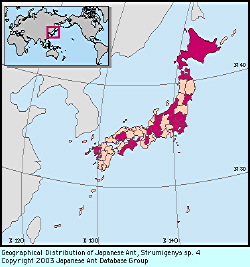
|
species
|
Strumigenys sp.4
|
 |
Japanese Name
|
Kita-uroko-ari
|
Description
|
|
Total length of workers around 2 - 2.5 mm. Body color yellowish brown to brown. Very similar to S. lewisi and Strumigenys sp. 9 [Minami-uroko-ari]; the workers almost indistinguishable. The dorsal portion of the postpetiole surrounded by spongiform appendage is relatively long compared to that of S. lewisi. In female: posterior paired ocelli well developed, distinctly margined with dark-colored spots; eyes relatively large; mesonotum relatively thick.
|
Remarks
|
|
The species is distinguished by its females having relatively large posterior ocelli and eyes. The shape of the mesosoma is similar to that of Strumigenys sp. 9. Nesting sites are almost the same as for S. lewisi (Masuko et al., 1985). Colonies are in general monogynous (Masuko et al., 1985). Strumigenys sp. 4 material from Hokkaido (Matsumae-kojima Island) was misidentified as S. lewisi by Munakata (1972).
|
|

Distribution
|
|
Hokkaido (southern part), Honshu, Kyushu; Korea.
|
|
References
|
|
- Masuko, K., H. Yamaoka, T. Kannari & S. Usuba (1985). Ants of Mt. Kiyosumi (4). . Kiyosumi , (11), 9-12. .
- Munakata, M. (1972). Records of a cicada, Melampsalta radiator, and an ant, Strumigenys lewisi from Hokkaido. . Kontyu , 40, 314.
|
Editor
|
|
Original text by Kazuo Ogata, Keiichi Onoyama and Mamoru Terayama. English translation by Kazuo Ogata, edited by Robert W. Taylor.
|
|